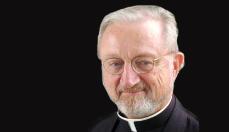There was the time in the recent past when students and faculty in American institutions of higher learning attempted to justify verbal abuse as a form of expression protected by academic freedom rights. Personal insults and ethnic slurs, it was argued, were a form of expression which should be permitted on a university campus.
This brought many of us to the realization that, although freedom of speech is connatural to the academic enterprise, the university is best seen as the home of rational discourse. The proper work of the university is to seek and disseminate truth. Truth emerges not from shouting matches, but from serious questioning and carefully thought out replies.
Anyone familiar with Jesuit tradition knows that Jesuit spirituality and Jesuit works are inspired, in large measure, by the Spiritual Exercises of Saint Ignatius Loyola. Two pivotal elements of the Exercises are respectful conversation and the practice of seeing everything in creation as the work of a loving God. St. Ignatius believed that, for a good relationship to develop between two persons, mutual respect is necessary.
A favorable interpretation should always be given to the other’s statement. If misinterpretation seems possible, it should be cleared up with Christian understanding. So, too, if actual error seems to be held, the best possible interpretation should be presented so that a more correct understanding might develop. Ignatius also considered a spirituality which finds God in all things to be a high form of prayer.
These elements of the Jesuit tradition explain the historic dedication of Jesuits to teaching and research – core functions of the university. In spite of their differing temperaments and styles, Jesuit academics love rational discourse. They are inspired by a spirituality which finds God in their work.
Respectful dialogue is absolutely essential to the student who wishes to develop the ability to think critically. Critical thinking requires that one cast aside gratuitous assumptions and seek reasons for one’s beliefs. This happens best when ideas are freely exchanged and tested. The free exchange of ideas is incompatible with the use of force or ridicule.
The spirituality of finding God in all things inspires scholarship. For a scholar working in the arts, the creative beauty of God can permeate painting, sculpture and music. A scientist can stand in awe at the magnificent simplicity of the equations which describe material events from the Big Bang to the present. An economist can know from the Gospel that business decisions cannot be unmindful of the needs of the poor. A scholar who teaches and does research in the social sciences will treat humans as reflections of the Divine. The lawyer knows that law, without the loving inspiration of the Spirit of God, kills; but that law, as a reflection of the will of God, sanctifies.
This respect for dialogue, and this interest in all of God’s creation, is at the heart of the Jesuit commitment to higher education. An institution of higher learning is not a parish, not an elementary school, not a high school. The desire to enter into dialogue with those who do not share our beliefs has consequences.
There are those who feel that a Catholic University should teach “pure” Catholicism. The work of the university is to help the church arrive at an understanding of what pure Catholicism really is. This requires dialogue with those who question our dearly held beliefs.
Pope Pius XI said that the church has nothing to fear from the truth. If we really believe that statement, we will be open to new ideas coming from all sources. What is most foreign to the university is the thought that new and tentative ideas are to be suppressed. This is precisely the opposite of what Pope Benedict meant when he said at Regensburg that religion should not be spread by force.
Loyola will host, on Nov. 6 and 7, a dialogue on intelligent design. A recurrent theme in the national dialogue, intelligent design raises two questions. First, is the world at the work of an intelligent designer? Second, is intelligent design really science? The university family will have an opportunity to enter into respectful and searching inquiry about our origins on this occasion.
The Rev. James Carter, S.J., was university president from 1974-1995. He is a professor in the physics department.








